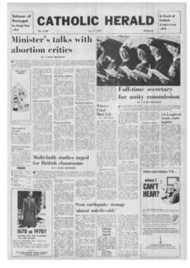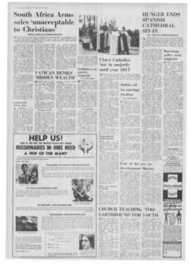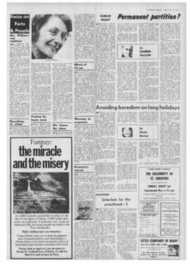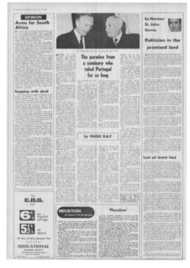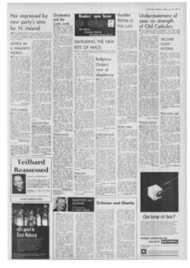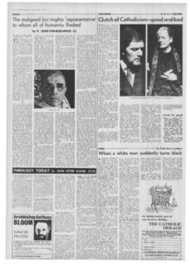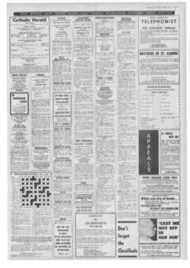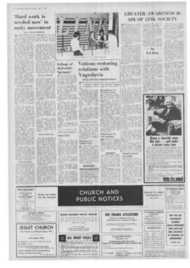Page 8, 31st July 1970
Page 8
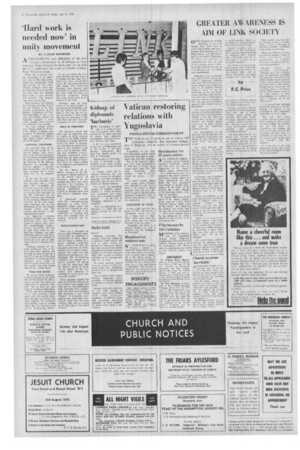
Report an error
Noticed an error on this page?If you've noticed an error in this article please click here to report it.
Tags
Share
Related articles
Big Team Of Catholic Observers
Anglican Welcome For New Marriage Rules
Christians Should Unite To Help Coloured People
Eartening Nity Talks
Need For Leadership In Church In 1976
`Hard work is needed now' in unity movement
BY A STAFF REPORTER
CHIEVEMENTS and difficulties of the ecu
menical commissions in all land and Wales formed the main day of a conference last week at
dioceses in Engtopic on the first Coloma College, West Wickham, Kent.
There was a general feeling, according to an observer. that the first fine enthusiasm for ecumenical work was passing. At first, interChurch contacts were new and exciting,. Now it was felt, the need was for detailed hard work less exciting, but essential. The momentum must not be lost. The conference was attended by 75 people, including four of the five bishops of the Ecumenical Commission of the Bishops' Conference ofEngland and Wales. It was a private consultation, mainly for Catholics engaged in unity work, though some eminent non-Catholics were present. The four bishops present were Bishop Holland of Salford; Bishop Langton Fox. Auxiliary of Menevia; Bishop Burke. Auxiliary of Salford, and Bishop Clark, Auxiliary of Northampton.
GROWING TOGETHER
An important event of the conference was a talk by Fr. Jerome Hamer, O.P., secretary to the Vatican Secretarial for Promoting Christian Unity. He spoke of the way in which the thinking of the different Churches on marriage was growing together particularly on whether, and in what way. marriage was a sacrament. and on its indissolubility. In the past, he said, only Catholics and Orthodox held that marriage was a sacrament. But increasingly the Churches saw it in close relation to the idea of the covenant between God and man. In the Old Testament, this supreme covenant was compared to the covenant between man and wife. In the New Testament. marriage was in turn illuminated by the relationship between Christ and His Church. and derived its special meaning from it. An important function, speakers stressed, was that of recruiting more and more priests to Church unity work. The breakthrough locallybecause the priest's role was so vital-came when he realised that working with other Christians wherever and whenever possible was essential to parish life-not just an additional item in a crowded timetable. Christian teachers of religious instruction had to discuss their work together, and to work in teams in putting it over. This was one of the main conclusions of the group which discussed unity work in schools on the second day. The R.I. teacher. they said. tended often to he a lonely figure.
NEED FOR BOOKS He needed more textbooks. constant training in new methods, and the chance of explaining to parents that there are news ways of teaching "divinity" just as there are new ways of teaching mathematics. There was great enthusiasm for a new approach which starts with the real-life situations the pupil encounters, and then suggests the scriptural and doctrinal ways of treating them. But the teaching must not be -theologically mushy." It must not bypass the doctrines the Church held, even if it pointed out that some doctrines were more central than others. By discussing doctrine and seeing how particular teachings were stressed and developed at certain periods, the child could he given an historical perspective while also made clearly aware of the fullness of his Faith.
Christians must be more aware of the need to plan for movements of population, and for the efficient use of their plant if they are not to run out of resources. They could plan for the newcomer in the new estate and town --by joint visitations and joint missions.
ROLE IN INDUSTRY The delegates agreed that there was an important role for teams of clergy working together for the whole welfare of people in hospital and their nurses, for those in universities, and those in polytechnics. Most of all. Christians could play a role in industry. showing their Christian concern. Industrial experienced conditioned men far more than experience in the place in which they lived: its values needed to be looked at and influenced by Christians, The Rev. Robert M. C. Jeffery, secretary of the Department of Mission and Unity of the British Council of Churches, suggested to the meeting that there was much experience for Catholics to draw on in taking part in industrial chaplaincies. The Church of England alone had 120 full-time industrial chaplains.
A substantial majority
voted that "non-participating attendance at each other's Eucharists fosters union. and we ask that it should be more encouraged." This was to he understood as meaning that those who attended must be properly prepared and instructed.
INTER-COMMUNION
There was a discussion on whether other Christians might occasionally be admitted to Communion at Mass, especially the bride or groom at a mixed marriage ceremony. Many speakers felt that this one-sided admission to Communion was in essence unecumenical. and could seem like offensive proselytising to other Christians. But the following resolution was passed by a narrow majority (29 against 22, and five abstaining, with the bishops taking no part): "In the opinion of this conference such admission to Communion could prove ecumenically fruitful."
Some delegates argued that since the Churches were not in fact united, those people who took part in inter-communion were breaking their communion with their own Churches. and producing a new "third Church." If eucharistic communion were used when interChurch unity had not been realised, what was to remain as the final sign of the united Church?
blog comments powered by Disqus


